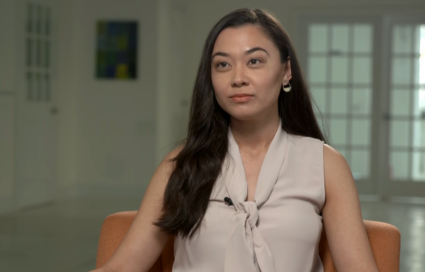
How Chanel Miller, victim of Brock Turner sexual assault, is no longer just 'Emily Doe'
Chanel Miller never raised her hand in college lectures to ask a single question. Naturally soft-spoken, she prefers to listen, observe and take information before starting her writing process. Then, when she's ready, she'll reemerge.
That's exactly what she's done with her new memoir "Know My Name," which details her fight for justice against Stanford swimmer Brock Turner, the man who sexually assaulted her in 2015, and her subsequent personal journey to healing.
"When I was writing the book, whenever I hit a low, I would take out two or three letters I would read them and people would say you have to keep walking forward for us," Miller told PBS NewsHour. "They would remind me that I was courageous for what I had already done."
WATCH: Chanel Miller, woman assaulted by Brock Turner, speaks out about healing after sexual assault
Miller, who until this month was known only as Emily Doe in legal filings, said she wasn't prepared for the shame and pervasive questioning that would follow her appearance in court.
"I thought alright he was caught, he's going to come back and have his head hung low and apologize for what he has done," Miller said.
That didn't happen. Instead, Turner hired a lawyer and tried to discredit her. The legal battle led to a trial–something Miller hoped would never happen for fear of being exposed and of losing what privacy she felt remained intact.
In many ways, Miller's book is a testimony to her experience beginning in the early morning of Jan. 18, 2015, and in the countless hours she later spent in a windowless California courtroom reliving so much of that trauma.
She describes how over a year and a half, she slowly lost her identity.
"I had my own dreams and enjoyments and goals before the assault happened. I felt like nothing more than a body. I was spoken about in a very just physical way, but I didn't feel human," Miller told NewsHour. "I always felt suffocated like no matter what I said, I couldn't be heard."
One primary example, in her mind, is when Turner's father read his statement to the court. As she recounts, it came soon after she had read hers. In the statement, Turner's father said his son is paying a "steep price" for what he characterized as "20 minutes of action."
"It was insulting," Miller said. "I thought, wow, I'm not sure he heard me, but I thought it's okay because the judge is about to settle everything."
She remembers the moment the verdict came in. Guilty. Prosecutors recommended six years, but when the six-month sentence was handed down, she began to question everything.
It had never occurred to her that Turner's sentence could be less than a year. Neither could many Americans. The sentence sparked months of protests at Stanford and across the U.S. Miller's impact statement was read before Congress by Rep. Jackie Speier, D-Calif., in 2016.
"I was honest about the panic attacks that I had, the shame, the guilt, the fear," Miller said, noting other sexual assault survivors experience similar emotions, and often suffer alone.
Miller recalls her loved ones noticed her being withdrawn, and had stopped eating as a result of the burden of the process.
"Even when your loved ones are telling you that they are proud of you, that they support you, you become deaf to it. You don't understand how to absorb it," Miller told NewsHour. "I had to teach myself to open myself to that love, and to feel it again, that took me a really long time."
Watch the full interview with Chanel Miller Tuesday on the PBS NewsHour.
Support Canvas
Sustain our coverage of culture, arts and literature.


















